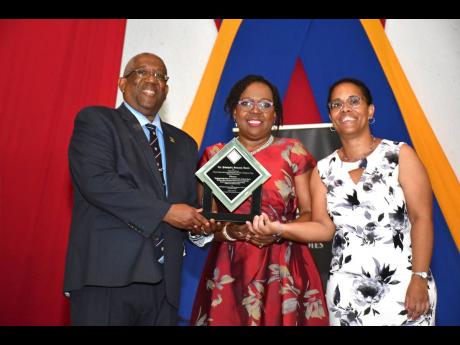COVID-19 impact study receives UWI Principal’s special award
AT THE recent UWI Principal’s Research Awards Ceremony, a study, titled ‘The Socio-economic Impact Assessment of COVID-19 and Policy Options in Jamaica’, conducted jointly by the United Nations Development Programme (UNDP), the Sir Arthur Lewis Institute of Social and Economic Studies (SALISES), and the Caribbean Policy Research Institute (CAPRI) received The Principal’s Special COVID-19 Impact Award.
The ceremony was the 25th instalment of the Principal’s Research Awards, as part of The UWI 75th anniversary celebrations. Professor Dale Webber, outgoing pro-vice-chancellor and principal of the Mona campus, said, among other things, “Research about COVID-19, research because of COVID-19, as well as research pre- and post-COVID-19 became the focal point of many researchers, and also seemed to draw researchers together in a manner never seen before.”
Other awards were doled out were for Best Research Publication, Research Project Attracting the Most Research Funds, Most Outstanding Researcher and the Most Outstanding Research Activity. The COVID-19 award is significant in light of the fact that the COVID-19 pandemic of 2020-2022 impacted every aspect of Jamaican life. The social and economic fallouts were the most devastating.
“The UNDP-SALISES-CAPRI study was commissioned by the United Nations Development Programme in Jamaica. The design and methodology were inspired by the need to assess the socio-economic impact of COVID-19, analyse and provide recommendations for policy priorities in the short term, and to enhance resilience and recovery for the future, particularly for vulnerable persons,” Dr Arlene Bailey, senior research fellow at the Sir Arthur Lewis Institute of Social and Economic Studies, told The Gleaner.
A UNDP Multi Country Office in Jamaica online publication of November 3, 2021 said the study “is the first comprehensive assessment that provides a definitive record of the impact and coping measures utilised in the management of the COVID-19 pandemic in Jamaica”.
“The report is the first systematic identification of the vulnerable segments of the society who have been negatively impacted by the pandemic. The in-depth analysis provided is new and valuable, as it presents policy options that can be used to reduce the impact of this and similar crises in the future,” the document said further.
The survey was conducted from February 24 to April 13, 2021, through 3,194 interviews, and the review of earlier studies as secondary sources. The UNDP’S SURGE team utilised the UNDP’s multidimensional vulnerability index, a first for any study in Jamaica, to measure and rank parishes and population groups according to 12 indicators called deprivations.
St Mary was assessed the most vulnerable parish to the impacts of COVID-19 in four or more of the 12 indicators assessed. It was closely followed by Manchester and St Ann. The parishes of St Thomas, Trelawny and Westmoreland were assessed the least vulnerable. The data also showed that 70 per cent of individuals in urban areas were vulnerable, compared to 63 per cent in rural areas.
The study found that the Jamaican Government and citizens need to be commended for their resilience and efforts at coping with the negative impact of the pandemic. However, the study revealed that urgent action is needed if the gains achieved in the fulfilment of the UN 2030 Agenda and Vision 2030 Jamaica are not to be lost irretrievably.
“The recommendations have helped to inform the UNDP Country Programme for Jamaica. The implications for monitoring and evaluation of socio-economic interventions have also been highlighted. There have also been policy discussions on multidimensional indices, and the findings of the multidimensional vulnerability index can support this,” Bailey said.
Other people and organisations involved in the project were team leader Professor Aldrie Henry-Lee (SALISES), pro vice-chancellor, graduate studies and research; Dr Damien King and Nicola Boyd (both from CAPRI) and Justice Okeugo (SALISES). They collaborated with the UNDP Jamaica resident representative and team members, the UNDP SURGE Data Hub in New York, a technical review committee for the Socio-economic Impact Assessment, co-chaired by UNDP Jamaica; and the Planning Institute of Jamaica, with committee members drawn from the Private Sector Organisation of Jamaica and the Statistical Institute of Jamaica.

